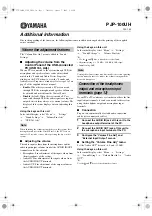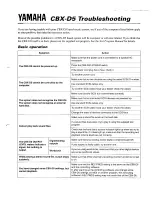
Forwarding Calls
17
(“Immediately”, “After Delay” or “On Busy”). However, only one forwarding
function can be activated for each mode.
Example:
You can configure “Immediate forwarding of external calls” to the number 333,
and “After Delay forwarding of internal calls” to the number 444.
Call forwarding is executed in the OpenCom 100, or in the case of external calls, in
the network operator’s exchange. The time for “After Delay” forwarding is preset in
the OpenCom 100 and can be changed by the system administrator in the Web
console’s
Configurator
.
If your system administrator has given you the authorisation, then you can also
program call forwarding for call numbers of other users.
“
MSN call forwarding” is available for ISDN multi-terminal accesses. Using this for-
warding mode, you can forward incoming
external
calls
to external destinations
for each MSN (multiple-subscriber number) – providing you have the necessary
authorisation (see also
MSN Call Forwarding
starting on page 20).
If a
queue
is active for your telephone, this is not taken into consideration when
configuring “Immediately” or “On Busy” call forwarding, and its content is
not
transferred to the destination terminal. Calls already in the queue can only be
accepted on the original terminal – after you have deactivated call forwarding. If
you have configured “After Delay” call forwarding, an incoming call enters a queue
if it is active and is forwarded after the delay. As with all other forwarded calls, you
can accept the call on the destination terminal.
On ISDN telephones, “Immediately”, “After Delay” and “On Busy” call forwarding
can also be set by means of a menu for all calls, i.e. internal and external.
On a SIP terminal you
cannot
use the code-number procedure procedure
described here to activate/deactivate call forwarding. You can also operate the
feature with the
OpenCTI 50
additional programme. To do so, the system adminis-
trator has to authorise you to use this programme. For more information, please
refer to the online help of the OpenCom 100.
Least Cost Routing (LCR) can be evaluated for call forwarding to external numbers,
providing your system administrator has configured LCR and the LCR application
in the OpenCom 100. Ask him about the applicable setting.
Summary of Contents for OpenCom 100 series
Page 1: ...OpenCom 100 Operation on Standard Terminals Quick Reference Guide...
Page 40: ...Index 38 Notes...
Page 41: ...Index 39 Notes...
Page 42: ...Index 40 Notes...
















































